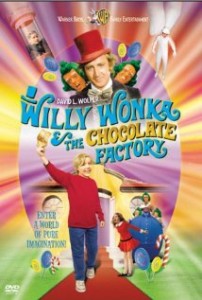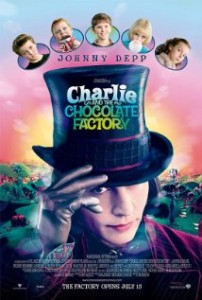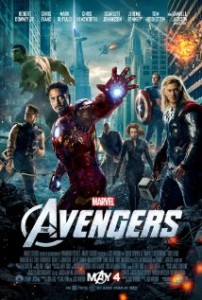 I can’t remember the first time I ever saw Willy Wonka and Chocolate Factory, but I have to say that it has always been one of my favorite movies of all time. Something about the light and dark of that movie-moving from Gene Wilder singing about how imagination can change the world one moment and creeping everyone out with poetry about danger growing while riding a boat through a dark tunnel and flashing pictures of insects and butchered chickens-taught me how wonder and fear and fun can merge to make something fantastic.
I can’t remember the first time I ever saw Willy Wonka and Chocolate Factory, but I have to say that it has always been one of my favorite movies of all time. Something about the light and dark of that movie-moving from Gene Wilder singing about how imagination can change the world one moment and creeping everyone out with poetry about danger growing while riding a boat through a dark tunnel and flashing pictures of insects and butchered chickens-taught me how wonder and fear and fun can merge to make something fantastic.
And then, more than thirty years later, one of my favorite directors, Tim Burton-a master of melding enjoyable creepiness with wonder and humor-announced that he was making a remake. And like so many people who know and love the original, I couldn’t wait to see the updated version of one of my favorite characters.
Only, I didn’t get that character.
In the 1971 version, director Mel Stuart and actor Gene Wilder created a character who has always been to me the epitome of the trickster. In the opening number “The Candyman”, we’re told he “mixes [everything] with love and makes the world taste good.” This happy image is quickly soured by a creepy tinker with a cart covered with knives who tells us how no one ever goes into or comes out of the Wonka factory (a scene that could easily come from any horror film). In fact, most anytime Wonka does something wonderfully fantastic, it’s quickly followed by tragedy. He plays a myriad number of tricks on his guests, and seems to enjoy the resultant mayhem. When Augustus Gloop gets sucked into a tube taking chocolate from the river, Wonka watches with obvious glee saying, “The suspense is terrible…I hope it’ll last.”
He never wastes his time trying to convince his victims to do or not do what they want. He simply puts an option out there, usually what the person wants most, and lets them decide what to do with it. When they make the wrong choice, he lets them know, though his half-hearted warnings are rarely heeded. And like with any good trickster, the people who are put through the gauntlet of his attentions come out the other end changed-hopefully for the better.
But in the end, we never know why Wonka behaves the way he does. We eventually find out his ultimate goal, but not why he is the odd candyman we’ve seen throughout the film. No history, no backstory, nothing about who Wonka really is or what his internal struggles are.
 In the 2005 version, Tim Burton and Johnny Depp turned our trickster into a childlike, socially inept man with crippling daddy issues. Instead of the unknowable magician Wilder gave us, Depp exhibits all the insecurities of the abandoned little boy we’re shown in the various flashbacks that pop up throughout the film. In place of Wilder’s eccentric, godlike magician, we get a candy-making genius who’s just plain wacky as he strays into over-the-top ridiculousness. Depp is baffled by the children’s behavior when they derail his tour with their antics, and instead of pushing his guests along out of planning for the next trick, he seems to do it because he simply doesn’t know how else to react.
In the 2005 version, Tim Burton and Johnny Depp turned our trickster into a childlike, socially inept man with crippling daddy issues. Instead of the unknowable magician Wilder gave us, Depp exhibits all the insecurities of the abandoned little boy we’re shown in the various flashbacks that pop up throughout the film. In place of Wilder’s eccentric, godlike magician, we get a candy-making genius who’s just plain wacky as he strays into over-the-top ridiculousness. Depp is baffled by the children’s behavior when they derail his tour with their antics, and instead of pushing his guests along out of planning for the next trick, he seems to do it because he simply doesn’t know how else to react.
At first blush, this change can be jarring for those of us who love the original. The character loses much of his charm with the retelling, yet, without this change, the movie would not work. Wilder’s Wonka would no more fit into Burton’s film than Depp’s in Stuart’s.
The point being that Burton isn’t telling the same story as Stuart, and the character has to serve the story. The tale turns from a boy learning that bad people get punished and good people rewarded, to an extremely strange man learning how to be part of a family. What little it keeps of the children’s parable is turned into window-dressing for a more abstract and adult tale.
As a writer, I find Depp’s version intriguing on an intellectual level. He and Burton took the backstory of Wonka’s childhood and ran with it. This new Wonka is frail, fault-riddled, often doesn’t understand the world he has segregated himself from, and all of it stems from being abandoned (figuratively and literally) as a child. Yes, maybe they perhaps ran a wee bit too far. And yes, with the introduction to a backstory in the repeated flashbacks and the resultant character development the film loses much of the wonder element that was so prevalent in the original.
Yet, keeping them would have told a different story.
What did I take away from this? Like most writers, I want to include as much as possible when telling the audience about my characters, and backstory can be invaluable when developing a central character. Yet, when deciding what to include in a story greatly depends on what story I want to tell. In a story where the focus is elsewhere or the character is more powerful without it, adding backstory can be detrimental. In the same vein, leaving it out for a complex, sympathetic character who needs an arch to be sustained throughout the tale or would appear too strange to sympathize with would be just as bad. So, the question becomes, what story am I trying to tell, and how does the inclusion of a character’s backstory add to it?



